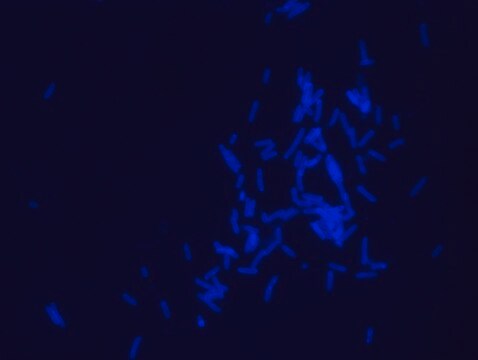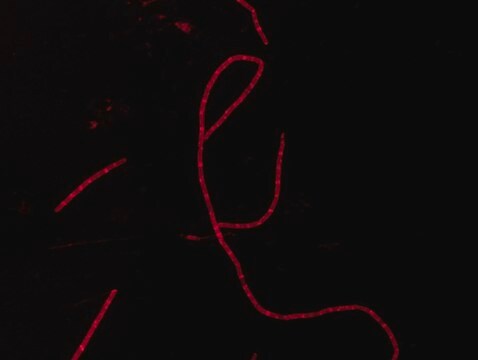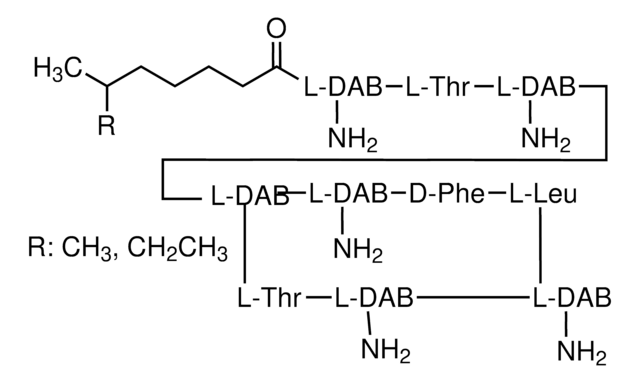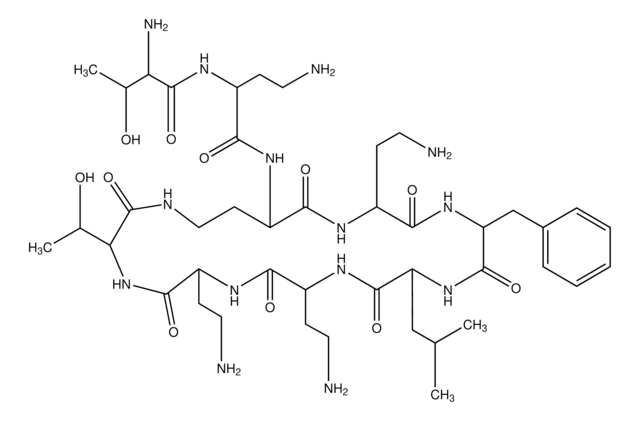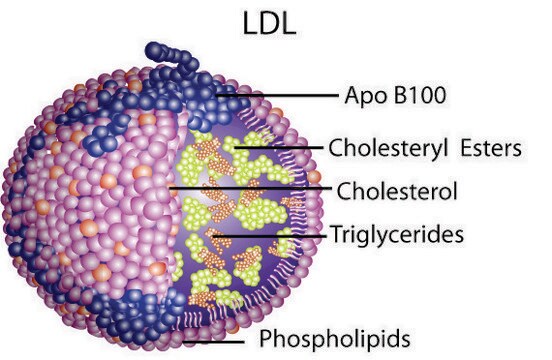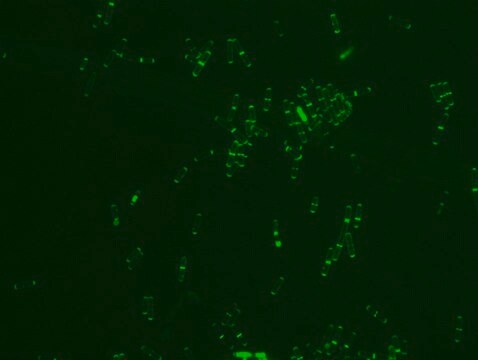SBR00036
Rhodamine B labeled Polymyxin B Ready Made Solution
For fluorescent microbial imaging, 1.1 mg/mL in water
Synonyme(s) :
SRB-PMB
Se connecterpour consulter vos tarifs contractuels et ceux de votre entreprise/organisme
About This Item
Code UNSPSC :
12352211
Produits recommandés
Niveau de qualité
Concentration
1.1 mg/mL in water
Type de lipide
saturated FAs
Température de stockage
−20°C
Catégories apparentées
Description générale
Rhodamine B labeled polymyxin B (SRB-PMB) is a fluorescent derivative of Polymyxin B. Rhodamine B polymyxin B is an additional fluorescent derivative of Polymyxin B, along with Dansyl labeled polymyxin B (Product # SBR00029). Both products′ mode of action is in accordance with Polymyxin B activity. Fluorescent antibiotics are obtained by synthetic conjugation of an antibiotic to a fluorophore.
Application
Fluorescent antibiotics can be used for many applications including:
Additional possible applications for Rhodamine B labeled Polymyxin B:
- Antimicrobial resistance research.
- Bacterial visualization and imaging.
- Parent antibiotic mode of action research and new antibiotic discovery.
- Toxicity studies.
- Research of bacterial infections and tracking its uptake in vivo.
Additional possible applications for Rhodamine B labeled Polymyxin B:
- Evaluate LPS binding by FRET (fluorescence resonance energy transfer) studies to form a specific complex between fluorescein (FITC)-tagged LPS and Polymyxin B, indicating direct binding of the antibiotic to the LPS
- Can be applied as a fluorescent probe to study polymyxin mode of action and its pharmacokinetics
- to assess the mitochondrial function of polymyxin B in a kidney cell line (LLC-PK1), suggesting that it changes the mitochondrial membrane polarization.
Remarque sur l'analyse
- Rhodamine B labeled polymyxin B Ready Made Solution is light sensitive.
- It is recommended to avoid freeze-thaw cycles of Rhodamine B labeled polymyxin B Ready-Made Solution
- Rhodamine B labeled polymyxin B Ready Made Solution (1.1mg/mL) can be diluted 1:100-200 in PBSX1 (Product# D8537) to achieve 0.55-1.1μg/mL final concentration for staining. The above concentration of Rhodamine B labeled polymyxin B was used for Escherichia coli staining (see image)
- Fluorescence Microscopy application: Rhodamine B labeled polymyxin B Ready Made Solution excitation (Ex) wavelength is 550-560nm resulting in emission (Em) range of 580-610nm (λmax=590-600nm)
Code de la classe de stockage
12 - Non Combustible Liquids
Classe de danger pour l'eau (WGK)
WGK 1
Point d'éclair (°F)
Not applicable
Point d'éclair (°C)
Not applicable
Faites votre choix parmi les versions les plus récentes :
Certificats d'analyse (COA)
Lot/Batch Number
It looks like we've run into a problem, but you can still download Certificates of Analysis from our Documents section.
Si vous avez besoin d'assistance, veuillez contacter Service Clients
Déjà en possession de ce produit ?
Retrouvez la documentation relative aux produits que vous avez récemment achetés dans la Bibliothèque de documents.
P R Schindler et al.
Antimicrobial agents and chemotherapy, 8(1), 95-104 (1975-07-01)
Though the primary action of the cationic antibiotic polymyxin B is against the membrane of susceptible bacteria, severe morphological changes are detected in the cytoplasm. Using fluorescence microscopy and a mono-N-dansyl-polymyxin B derivative, we could demonstrate aggregations of the antibiotic
Vincent H Tam et al.
Antimicrobial agents and chemotherapy, 49(9), 3624-3630 (2005-08-30)
Despite limited data, polymyxin B (PB) is increasingly used clinically as the last therapeutic option for multidrug-resistant (MDR) gram-negative bacterial infections. We examined the in vitro pharmacodynamics of PB against four strains of Pseudomonas aeruginosa. Clonal relatedness of the strains
R E Hancock
Lancet (London, England), 349(9049), 418-422 (1997-02-08)
The era of the "classical antibiotic" may be over. The emergence of resistance has seen to that. Yet no truly novel class of antibacterial agent has come on the market in the past 30 years. Currently there is great interest
M E Evans et al.
The Annals of pharmacotherapy, 33(9), 960-967 (1999-09-24)
Polymyxin B sulfate and colistin, also known as colistimethate, have not been used for many years because less toxic antimicrobials are available. Gram-negative bacteria that are resistant to the aminoglycosides, beta-lactams, and fluoroquinolones are becoming more common. These bacteria are
Notre équipe de scientifiques dispose d'une expérience dans tous les secteurs de la recherche, notamment en sciences de la vie, science des matériaux, synthèse chimique, chromatographie, analyse et dans de nombreux autres domaines..
Contacter notre Service technique